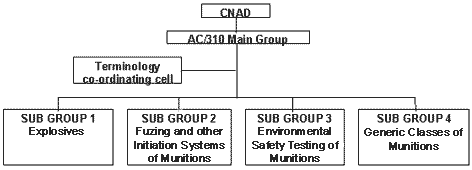The
Group on Safety and Suitability for Service for Munitions and
Explosives.
AC/310

|
INTRODUCTION
The
"Safety and Suitability for Service of Munitions and Explosives"
is of fundamental importance to those involved with Munitions and Military
Explosives. Each nation has a responsibility to ensure that the equipment
used by their armed forces is intrinsically safe to use and that it
will remain so under normal operational and storage conditions. On behalf
of NATO, AC/310 is establishing a common baseline for safety and suitability
for service to ensure that allied nations have confidence in the safety
of the equipment used within the alliance. Subject to operational compatibility,
the efficiency and effectiveness of NATO forces will be enhanced by
the ability to use munitions from a common source with confidence that
it will be safe.
HISTORY AND
MISSION OF AC/310
The
group was formed in 1979 to agree a philosophy and apply a methodology
for the assessment of the Safety and Suitability for Service of Munitions
and Explosives. It became a Partnership Group in 1997.
The
designated aim of the Group is to establish agreed international terminology,
design principles, criteria and procedures, as well as consideration
of the service operational conditions by which assessments of safety
and suitability for service of munitions are made. The term Munition
encompasses missile, gun and mortar projectiles launched from land,
sea or air and their associated fuzing systems. The group also considers
special categories of munitions, such as mines, grenades, flares, gas
generators and demolition material. The Group is also closely associated
with the work on Insensitive Munitions (IM)/ Munition a Risque Attenues
(MURAT);
AC/310 ORGANISATION
